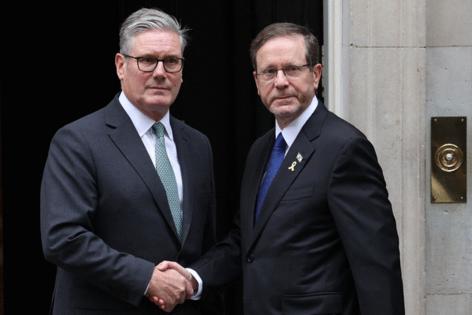PM Keir Starmer recasts flagging premiership as fight for UK 'soul'
Published in News & Features
Amping up attacks on his noisiest rival, Prime Minister Keir Starmer framed his political survival as his country’s best hope of defeating populism.
Heading into his Labour Party’s annual conference trailed — only 15 months after an election — by doubts about his ability to lead them into the next one, his message seemed to be that they’re fighting it already.
Using a BBC interview to draw political battle lines with Nigel Farage’s Reform UK, Starmer said his government is in a contest for the nation’s “soul.” He called one of Farage’s signature immigration policies racist and immoral.
“We have not had a proposition like Reform in this country ever before, and we’ve seen it in France and Germany and plenty of other countries,” Starmer said. “This is a different fight. It is a fight about who we are as a country.”
Starmer is trying to regain the faith of Britain’s electorate amid complaints his government is not taking radical enough action on concerns like the cost of living and migration. His comments signal a bolder approach to the challenge posed by an insurgent populist right that’s looking to emulate U.S. President Donald Trump’s electoral success.
Despite winning just five seats in the House of Commons in the July 2024 vote — compared to Labour’s 411 — Reform has led national polling since April, and a major survey last week found Farage on track to be the next prime minister if an election were held now. That’s forced Britain’s other parties to take notice.
By contrast, Starmer’s approval rating is the worst of any prime minister in a data series stretching back to 1977, Ipsos polling showed this weekend. Just 13% of those polled said they’re satisfied with his stewardship of the country, against 79% who are dissatisfied. That gave a net rating of minus 66% — worse than the previous low of minus 59% hit by Rishi Sunak last year and John Major back in 1994.
In a step-change in rhetoric, the prime minister condemned a proposal this month by Farage to abolish the indefinite leave to remain in the country enjoyed by hundreds of thousands of existing legal migrants, deporting those who don’t qualify for planned new visas. The policy was criticized widely as unworkable and concerned the City of London.
“I do think it’s a racist policy,” the premier told the BBC. “It’s immoral and we need to call it out for what it is.” He made the distinction that he did not think those considering voting for Reform are racist.
Still, Starmer risks alienating some voters who previously backed Labour but are considering voting for Farage. Liberal candidates have often struggled to calibrate their attacks on the populist right, most famously in the case of Hillary Clinton, who failed to turn around her fortunes by describing some of Trump’s supporters as “deplorables” before the 2016 presidential election.
Prime Minister Anthony Albanese of Australia placed Starmer’s troubles in a global context when he addressed the conference hall, identifying in the UK premier the determination to “defend democracy itself.”
The prime minister’s authority has come into question following a series of missteps and high-profile departures from his senior team, most notably the firing of U.S. ambassador Peter Mandelson following a Bloomberg News investigation into his relationship with disgraced financier Jeffrey Epstein. The tumult has created an opportunity for Labour rivals including Andy Burnham to begin agitating to replace him in the event that his administration falls.
“Now is not the time for introspection or navel gazing,” the prime minister said. “We’ve got to take on Reform.”
Labour strategists told Bloomberg there was a clear route to reelection if the party could deliver on the median voter’s concerns on migration and the economy while earning the support of what they see as millions of Britons who would not want Farage to enter 10 Downing Street. For their part, a Reform UK official said Starmer had fallen into a trap laid by Farage.
Chancellor of the Exchequer Rachel Reeves speaks to the conference on Monday, and is expected to address Labour’s plans for Britain’s flat-lining economic growth and productivity crisis. She will speak against the backdrop of a gilt market that has proved itself ready to punish any suggestion of fiscal profligacy.
In his interview, Starmer also:
—Declined to give a yes-or-no answer when asked if he could rule out raising VAT, saying “the manifesto stands.”
—Reiterated that special-educational-needs benefits need to be reformed.
—Denied a Sunday Times story that he’d put a £20,000 ($27,000) donkey field he had gifted to his parents in a special trust that allowed him to later avoid inheritance tax.
The prime minister said his aim at this week’s convention was to set out a clearer narrative about what his government was trying to achieve, a tacit admission that it had so far struggled to articulate its policies and objectives. He pledged to make a “big argument” about “the soul of the country.”
“I want nobody to leave this conference not knowing what matters most to me and the government,” he said. “At the end of it, people can say I agree or disagree, but they can’t say I don’t know what he stands for, I don’t know what he’s trying to achieve.”
_____
©2025 Bloomberg L.P. Visit bloomberg.com. Distributed by Tribune Content Agency, LLC.







Comments